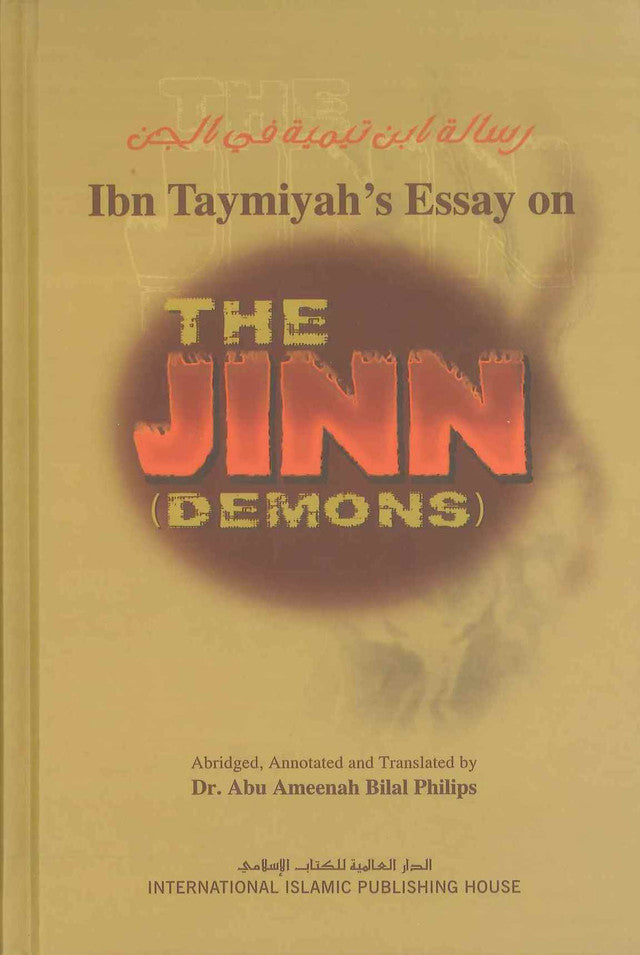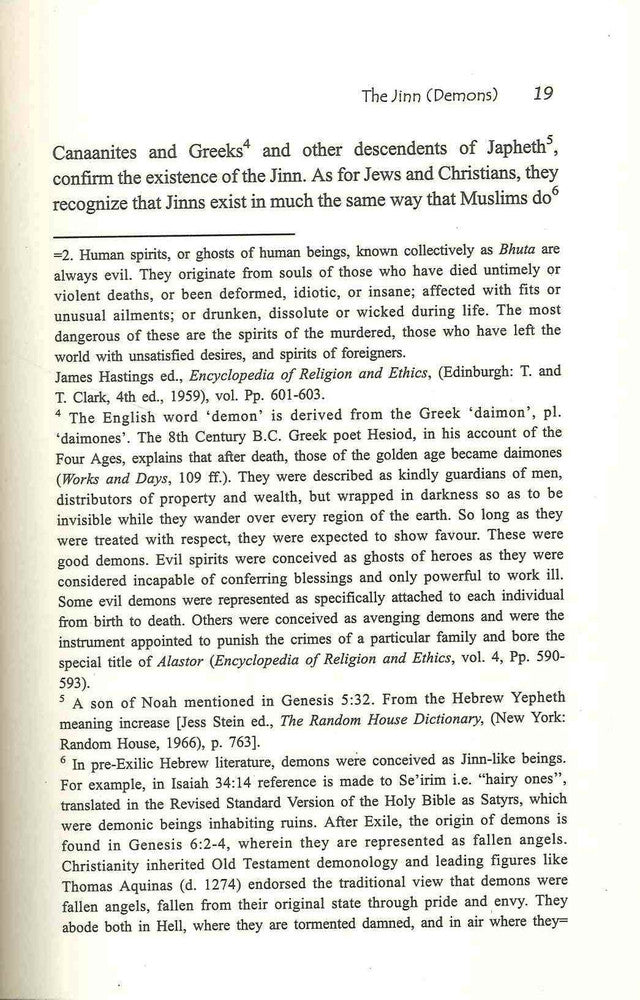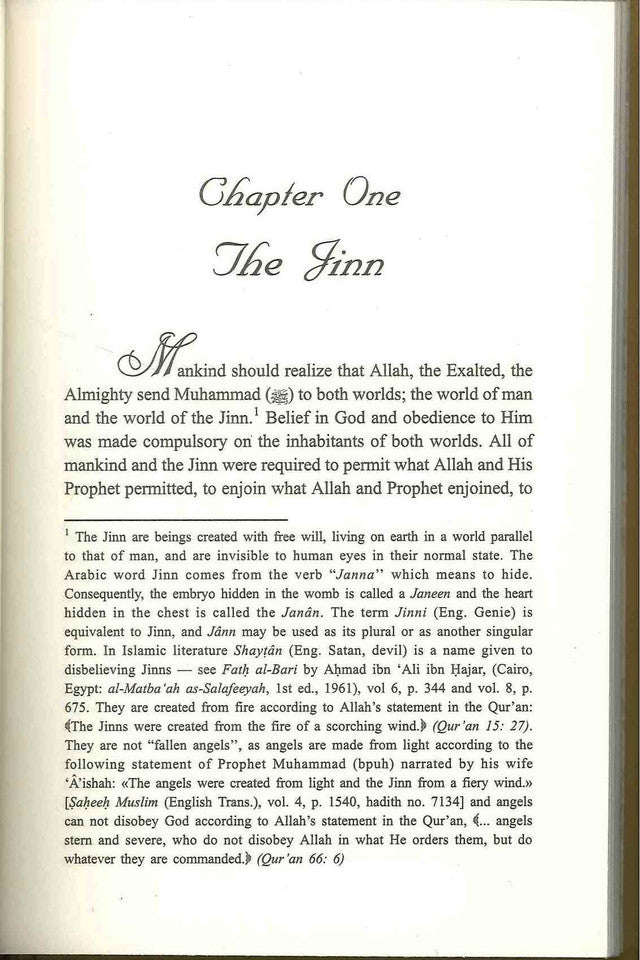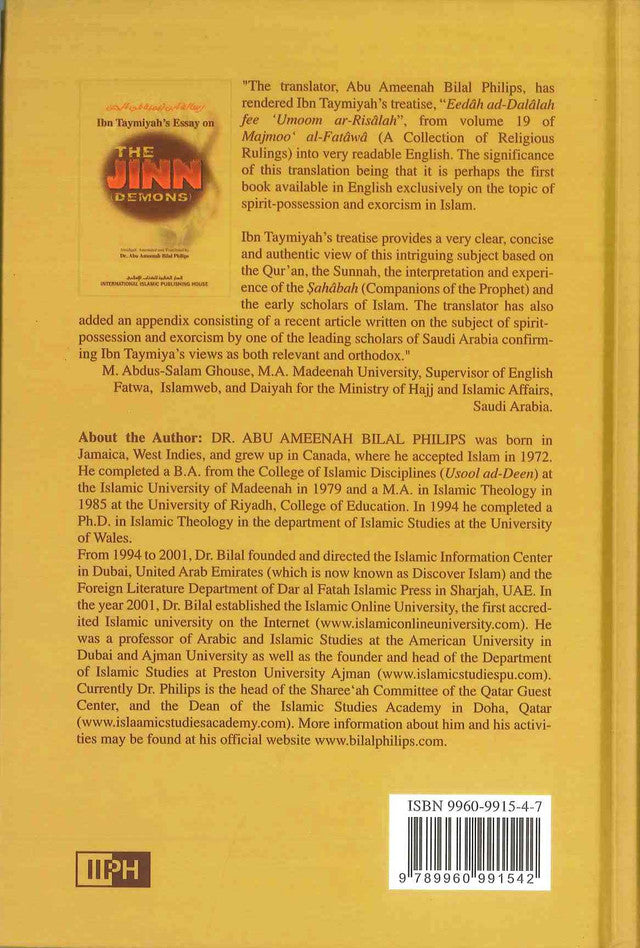Ibn Taymiyah's Essay on the Jinn ( Demons )
Ibn Taymiyah's Essay on the Jinn ( Demons )
Publisher:
IIPH (International Islamic Publishing House)
Language:
English
Binding:
Hard Cover
Pages: 136
Size: A5
Couldn't load pickup availability




Collapsible content
Description of Book
Ibn Taymiyah's Essay on the Jinn ( Demons )
Publisher
IIPH (International Islamic Publishing House)
Author
Sample Pages - Content
PAGE NO :1
Ibn Taymiyah's Essay on(DEMONS)Abridged, Annotated and Translated byDr. Abu Ameenah Bilal PhilipsINTERNATIONAL ISLAMIC PUBLISHING HOUSE
PAGE NO :2
The (Demons) 19Canaanites and Greeks4 and other descendents of Japheth5confirm the existence ofthe Jinn. As for Jews and Christians, theyrecognize that Jinns exist in much the s•me way that Muslims d06—2, Human spirits, or ghosts of human beings, known collectively as Bhuta arealways evil, They originate from souls of those who have died untimely orviolent deaths, or been deformed, idiotic, or insane; affected with fits orunusual ailments; or drunken, dissolute or wicked during life. The mostdangerous of these are the spirits of the murdered, those who have left theworld with unsatisfied desires, and spirits of foreigners.James Hastings ed., Encyclopedia of Religion and Ethics; (Edinburgh; T. andT. Clark, 4th 1959), vol. pp. 601-603.4 The English word *demon' is derived from the Greek 'daimon', pl.'daimones•. The 8th Century B.C, Greek poet Hesiod, in his account of theFour Ages, explains that after deatht those of the golden age became daimones(Works and Days, 109 ft). They were described as kindly guardians of men,distributors of property and wealth, but wrapped in darkness so as to beinvisible while they wander over every region of the earth. So long as theywere treated with respect, they were expected to show favour, These weregood demons. Evil spirits were conceived as ghosts of heroes as they wereconsidered incapable of conferring blessings and only powerful to work ill.Some evil demons were represented as specifically attached to each individualfrom birth to death. Others were conceived as avenging demons and were theinstrument appointed to punish the crimes of a particular family and bore thespecial title of Alastor (Encyclopedia of Religion and Ethics, vol. 4, Pp. 59'0•593).A son of Noah mentioned in Genesis 5:32. From the Hebrew Yephethmeaning increase (Jess Stein ed., The Random House Dictionao, (New York:Random House, 1966), p. 763).6 pre-Exilic Hebrew literature, demons were conceived as Jinn-like beings.For example, in Isaiah 34;14 reference is made to Se'irim i.e. "hairy ones",translated in the Revised Standard Version of the Holy Bible as Satyrs, whichwere demonic beings inhabiting ruins. After Exile, the origin of demons isfound in Genesis 612-4, wherein they are represented as fallen angels.Christianity inherited Old Testament demonology and leading figures likeThomas Aquinas (d. 1274) endorsed the traditional view that demons werefallen angels, fallen from their original state through pride and envy: Theyabode both in Hell, where they are tormented damned, and in air where they
PAGE NO :3
ap/er One7Äe Sinnankind should realize that Allah. the Exalted. theAlmighty send Muhammad (g) to both worlds; the world Of manand the world of the Jinn. I Belief in God and obedience to Himwas made compulsol)' on the inhabitants of both worlds- All ofmankind and the Jinn were required to permit what Allah and HisProphet permitted, to enjoin what Allah and Prophet enjoined, toThe Jinn are beings created with free will, living on earth in a world parallelto that of man, and are invisible to human eyes in their normal state. TheArabic word Jinn comes from the verb "Janna" which means to hide,Consequently, the embryo hidden in the womb is called a Janeen and the hearthidden in the chest is called the Janån. The term Jinni (Eng. Genie) isto Jinn, and may be used as its plural or as another Singularform- In Islamic literature Shaytån (Eng. Satan, devil) is a name given todisbelievtng Jinns — see Fato ad-Bari by Ahmad ibn 'Ali ibn Vajar, (Cairo,Egypt: as-Salgfeeya.k, 1st 1961), VOI 6, p. 344 and vol. 8, p.675. They are created from fire according to Allah's statement in the Qur'an:(The Jinns were created from fire of a sgoozhing wind-y (Qur•an 15: 27).They are not "fallen angels", as angels are made from light according to thefollowing statement Of Prophet Muhammad (bpuh) narrated by his wife•Xisha_h; «The angels were created from light and the Jinn from a fiery wind»(English Trans.), vol. 4, p. 1540, hadith no. 7134] and angelscan not disobey God according to Allah'S Statement in the Qur'an, angelsStem and severe, who do not disobey Allah in what He orders them, but dowhatever they are commanded,) (Qur'an 66: 6'
PAGE NON:4
"'Ihe translator. Abu Ameenah Bilal Philipe hasrendered Ibn Tuymiyah •s Iteatise. " Et'düh ad-DalilahJee 'Unroom or-Risä/alj', from volume 19 OfMajmao' al•Futåwå CA Collection of ReligiousRulings} into very readable English, The significanceof this translation being it is perhaps the firstbook available in English exclusively on thc topic ofspirit-possession and exorcism in (slam,Ibn Taymiyah's treatise provides very clear, conciseand authentic view of this intriguing subject basedthe Qur'an, thc Sunnah. (he interpretation andenec Of thc (Companions Of the Prophet) andthe early scholars of Islmm. The transEator alsoadded an consisting of a recent article written on the subject Of spiril-possession and exorcism by one of thc leading scholars Of Saudi Arabia confirm-ing Ibn Tåymiya•s views as both relevant and 041hod0K„•M. Abdias-Salam Ghousc, M.A. Madeenah University; Supervisor of EnglishFatwas Islamweb, and Duiyah for the Ministry Haji Islamic Affairs.Saudi Arabia.About the Author: ABU AMEENAH PHILIPS was born inJamaica, West Indies. and grew up in Canada, whe;te he accepted Islam in 1972.He completed a B,A. from the College 01 Islamic Disciplines (Usool ad-Dee•t) atthe Islamic University of Madeeoah in 1979 and a M.A. in Islamic in1985 at lhe University of Riyadh. COIIcgc of Educatim, JO 1994 he completedPhD. in Islamic Theology in the department Of Jslumie Studies at the Universityof Wales.From 1994 to 2001 Bil"l founded directed the Islamic luformation Centerin Dubai. United Arab Emirates (which is now known as Discover Islam) and thcForeign Literature Department of Ijar Fatah Llamic Press in Sharjah, UAE. Inthe year 2001 Dv. Bilal established Islamic Online University, thc firstited Islamic university on the Internet (www;islamiconlineunivc:rsity,con), Hewas a professor Of Arabie and Islamic Studies at the American University inDubai Ajmon University as well as thc founder and head Of DepartmentOf Islamic Studies Preston University Ajman (www.islamicstudiespli.com},Currently Dr. is the head or thc Sharee•ah Committee of thc Qatar GuestCenter. and the Dean of thc Islamic Studies Academy in Doha, Qatar(www.isluarniestucliesacademy.com), More information about him and his activi-tics may be found hig official website .
Dr. Abu Ameenah Bilal Philips
Dr. Abu Ameenah Bilal Philips is a renowned Islamic scholar, author, and educator known for his efforts to make Islamic knowledge accessible to a global audience. A convert to Islam, he has authored numerous books on Islamic theology, jurisprudence, and personal development. He founded the Islamic Online University (IOU), offering free and affordable Islamic education worldwide. Dr. Bilal Philips is respected for his clear and straightforward approach to explaining Islamic principles and for promoting a balanced understanding of Islam based on the Quran and Sunnah.




